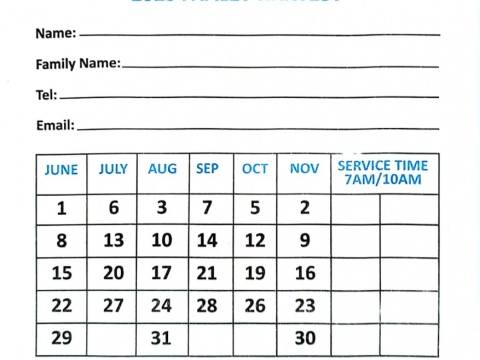- Have any questions?
- +234 8111114588
- info@avmcc.org.ng
THEME: ACCEPTING GOD’S HOLY WILL
FAMILY REUNION: LET THERE BE LOVE – 1 COR. 13:13
December 24, 2018Bulletin for 30th Dec. 2018
January 2, 2019
READINGS: ISAIAH 7:10-17; PSALM 45:10-END; ROMANS 1:1-7; LUKE 1:26-38a.
INTRODUCTION: After the Creation and during the fall, through Adam and Eve, man fell completely from the fellowship with God. Could God just forgive man and forget the rebellion? There are several reasons why God couldn’t do this. If He just forgave man and let him continue in the lifestyle he was in God would go back on His word. God said death was the penalty for disobedience. This involves more than physical death. It involves eternal separation from God. Someone had to pay the penalty. If God set the penalty aside it would undermine His integrity, this would make everything God says and does questionable. No matter how much God loves man and desires to forgive him, His love could not nullify the penalty. Justice must be served. Why did God create living beings whom He knew would rebel against Him and be doomed to eternal punishment? Why couldn’t God, being all-powerful keep Adam and Eve and their descendants from disobeying Him? Merely forgiving Adam and Eve for their rebellion would not have solved the basic problem. Giving them a new start in life would have made no difference. The rebellion would occur over and over as often as God forgave. Creating another Adam and Eve would only result in the same failure. The human race that existed had to be delivered from the penalty of sin. But how? God must provide a Redeemer who must come into the World!. Hence, the reason for the coming Redeemer!
The coming Redeemer as spoken in the Scriptures points OUR attention to the Birth of Christ Jesus, the Messiah that we celebrate and commemorate His Birth and Incarnation at this time and season. The messianic prophecy in Isaiah is used as proof texts for the deity of Jesus Christ because of the words, ‘Immanuel,’ (God with us). Isaiah’s prophetic words were uttered during Old Testament days when the kingdom was divided and at war against each other. The ten northern tribes were called Israel, while the southern tribes were known as Judah or the House of David, since the bloodline of their patriarch David was from Judah. The king of Israel (Pekah) and the king of Judah (Ahaz) were both wicked and had forsaken the way of God. Syria and the Northern Kingdom of Israel had formed alliance and were determined to bring Judah into their alliance, overthrow Ahaz, share the spoils of defeating Jerusalem and substitute a Syrian puppet king in Jerusalem. The Syrian leagued with Israel sent fear through the outnumbered forces of Judah. The first attack was unsuccessful but it was all certain they would not fail a second time. Even though Ahaz was an unrepentant and wicked king, God uses Isaiah to assure Ahaz of His deliverance, treating him with kindness altogether undeserved. God’s offer of a sign of His deliverance is ridiculed by the arrogance and unbelief of Ahaz.
The Lord offered a positive miracle to boost Ahaz’ faith, but Ahaz, having made up his mind to put his trust in Assyria, put Isaiah off with a hypocritically pious pretext by misquoting and distorting the meaning of the commandment in the Law of Moses not to tempt the LORD (Deuteronomy 6:16). Later Ahaz would pay tribute to the king of Assyria with the sacred Vessels of the Temple in exchange for his help in defeating Israel and Syria. For this he would pay with his life and hasten judgment upon Judah and Jerusalem.
Isaiah 7:14 literally means that within a short time, Isaiah’s wife, a virgin at the time this prophetic promise was given, would give birth to a son as the “sign” God promised (Isaiah 8:1-4). The Literal fulfillment of the prophecy concerning the virgin that shall conceive a child was initially directed at Ahaz, and in a larger sense, all of the House of Judah, of whom he was king. Therefore Matthew 1:20 and Luke 1:27 affirm that JOSEPH vicariously serves as the recipient of God’s initial promises on behalf of fleshly bloodline of Judah, (the House of David). Matthew 1: 23 was the spiritual fulfillment of the prophecy in that a virgin named Mary conceived and bore a son, Immanuel, the Christ. From this time on Judah lost its physical blessing as the heritage of the House of David. The prophecy would find fulfillment in the spiritual land of the promised Redeemer. To whom was the prophecy of Isaiah 7:14 was LITERALLY fulfilled? To Joseph, husband of Mary whom the angel gave this message to in a dream saying , “…..Behold, the virgin shall be with child, and bear a Son, and they shall call His name ‘Immanuel’, which is translated, “God with us.” (Matthew 1:23). In the Isaiah account as described earlier, the tribe of Judah foolishly used Immanuel to boast, “God was with them,” when in reality Yahweh was about to judge them by using the Assyrian army whom Ahaz had allied with to strip Samaria of all they had.
THE Coming Redeemer is the Lord Jesus whom we remember at this Advent which is a time to celebrate both the past and the future, as we remember when Jesus came into this world around 2000 years ago, born as a baby, fully human and also fully God. The coming Redeemer came, lived a perfect life, suffered a cruel death on a cross, carried the punishment of our sins, rose triumphantly from the grave, ascended into Heaven, and one day He will return. As He had come as the coming Redeemer, He would also come as the coming Judge not to Redeem but to take away the Redeemed.
In the second Text above (John 1; 26 & 27), John the Baptist was pointing the attention of his audience to the coming Redeemer (who according to John) would come to forgive sins as the Son of God. John the Baptist said he was not even fit to be Christ’s slave to perform the humble task of unfastening his sandals!
His second coming/ return is good news for those who trusted in Him as Lord and Saviour.
Good news for those who have already repented and turned from their sins.
Good news for those who are living as disciples of Jesus.
Good news for those whose destiny is to spend eternity with God.
WHAT DOES THE ‘COMING REDEEMER’ MEANS TO US?
A God who cares for us; who understands us; who loves us; who is with us; who forgives us; who gives us the free gift of salvation; who has saved and REDEEMED us. As we celebrate the remembrance of His Birth at this season, let us be assured that there is still TIME for our PERSONAL/INDIVIDUAL REDEMPTION before He would come back again for Final Separation, Harvests and Judgement.



